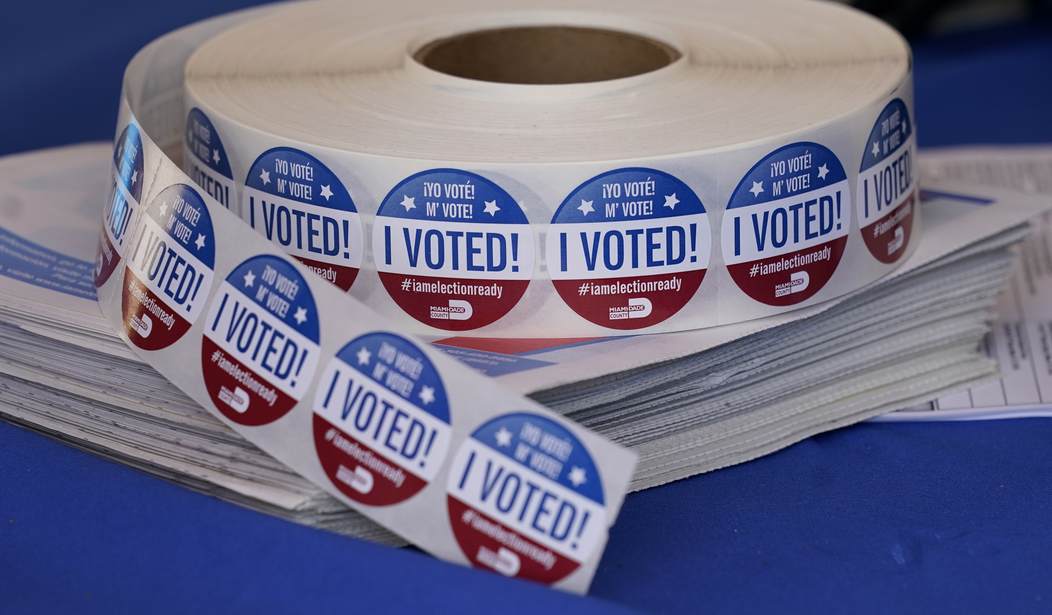We've heard from plenty of public figures using their voices to speak about the Georgia election reform law. Unfortunately, it's been to mislead. On Wednesday, an advertisement was circulated to newspaper outlets such as the Washington Post and the New York Times, containing hundreds of big names signing onto a letter opposing the law.
The text of the letter, "WE STAND FOR DEMOCRACY," reads:
A Government of the people, by the people.
A beautifully American ideal, but a reality denied to many for much of this nation’s history.
As Americans, we know that in our democracy we should not expect to agree on everything.
However, regardless of our political affiliations, we believe the very foundation of our electoral process rests upon the ability of each of us to cast our ballots for the candidates of our choice.
For American democracy to work for any of us, we must ensure the right to vote for all of us.
We all should feel a responsibility to defend the right to vote and to oppose any discriminatory legislation or measures that restrict or prevent any eligible voter from having an equal and fair opportunity to cast a ballot.
Voting is the lifeblood of our democracy and we call upon all Americans to join us in taking a nonpartisan stand for this most basic and fundamental right of all Americans.
The letter was paid for by Ursula Burns, Debra Lee, Ken Jacobs, Joel Cutler, David Fialkow, Hemant Taneja, Casey Wasserman, Ken Chenault, Ken Frazier, William Lewis, Clarence Otis, Charles Phillips, and references the Black Economic Alliance.
Signatories include big name companies, such as Amazon, Netflix, Facebook and Twitter. Katy Perry, Leonardo DiCaprio, Joaquin Phoenix, George Clooney, and JJ Abrams make up some of the celebrities who also signed on.
Recommended
That the text contains words to live by is not the point when the advertisement is in response to a law that does do not do what it is being accused of.
Yet as Todd C. Frankel of the Washington Post reported on, with Sunday's "More than 100 corporate executives hold call to discuss halting donations and investments to fight controversial voting bills," that zoom call in question referenced Georgia's law.
According to Frankel, with added emphasis:
The discussion — scheduled to last one hour but going 10 minutes longer — was led at times by Kenneth Chenault, the former chief executive of American Express, and Kenneth Frazier, the chief executive of Merck, who told the executives that it was important to keep fighting what they viewed as discriminatory laws on voting. Chenault and Frazier coordinated a letter signed last month by 72 Black business executives that made a similar point — a letter that first drew attention to the voting bills in executive suites across the country.
The reporting also contains statements from Professor Jeffrey Sonnenfeld of Yale, who was an organizer of the call. He said that Saturday's call "shows they are not intimidated by the flak. They are not going to be cowed. They felt very strongly that these voting restrictions are based on a flawed premise and are dangerous."
What's "flawed" and "dangerous" is the false claims against this law and others like it. Again, this is how all an illustration of how the law's critics view it as.
The Georgia law actually expands early voting access, and the voter ID requirements are supported by strong majorities of voters, including the people the law's critics claim to speak for. The law also increases transparency and accuracy for elections. Jason Snead of Honest Election Project recently spoke to Townhall about how the legislation holds election officials accountable on aspects of voting, such as keeping lines down. You can read more about his thoughts here.
Amusingly enough, those who have moved their projects out of Georgia in protest of this law have instead gone relocated to states with more restrictive voting laws. The All-Star game was moved out of Atlanta in favor of Denver, as Katie reported. And, as Guy reported earlier today, Will Smith and Antoine Fuqua will no longer shoot "Emancipation" there, and will instead go to Louisiana. What cannot be underscored though is the loss of business revenue for Georgia.
While the White House tried to avoid blame for the All-Star game being moved out of Georgia, MLB referenced President Joe Biden's criticisms of the law as the reason for their decision. In addition to his comments during a March 31 interview with ESPN signaling "strong support" for moving the game, the president has repeatedly lied about and mischaracterized the law, which includes referring to the legislation as "Jim Crow on steroids." His claims that the law restricts early voting in Georgia earned "four pinocchios" from the Washington Post's fact-checker.
The real danger Americans should be worried about is HR 1, the "For the People Act," a nearly 900-page piece of legislation which aims to federalize the entire electoral system, and which will force states to cede control of their powers over to bureaucrats in Washington, D.C. The legislation has been widely condemned as unconstitutional, and has been used as an example from both sides of the argument when it comes to keeping or getting rid of the filibuster.

























Join the conversation as a VIP Member